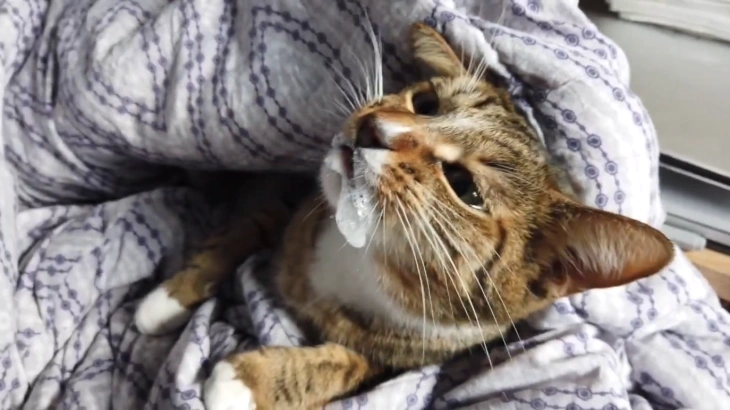Is Your Cat Throwing Up White Foam? Causes, Solutions & Prevention Tips
By: Elizabeth Rikas

The information in this article is intended to educate cat parents and is not a substitute for veterinary guidance. In case of any concerns about your cat’s health, please talk with your veterinarian.
It is not unusual for cats to throw up white foam occasionally due to empty stomach or indigestion (mix of gastric juices and air), but frequent vomiting within a short timeframe may indicate a serious issue.
Understanding the potential causes and appropriate responses is crucial for your feline’s health.
What Is White Foam In Cat Vomit?
White foam in cat vomit typically consists of gastric juices and mucus produced in the stomach. When a cat’s stomach is empty, these substances can accumulate, leading to foamy vomit. This differs from regular vomit, which often contains food particles or bile.
Common Causes Of Cat Throwing Up White Foam
1. Indigestion Or Empty Stomach
Cats may vomit white foam when their stomachs are empty. This often occurs in the morning before feeding. An empty stomach can cause irritation and the buildup of gastric acids, leading to vomiting.
2. Hairballs
During grooming, cats ingest hair that can accumulate and form hairballs. If a hairball isn’t expelled through normal digestion, it can cause your cat to vomit white foam along with the hairball.
3. Gastritis Or Stomach Irritation
Inflammation of the stomach lining can lead to vomiting white foam. This may result from dietary indiscretion, infections, or ingestion of irritants.
Related: Can Cats Eat Pumpkin?
4. Eating Too Quickly Or Overeating
Cats that eat rapidly or consume large amounts may vomit white foam due to stomach overload or irritation.
Serious Health Issues Related To White Foam Vomiting
1. Pancreatitis
Inflammation of the pancreas can cause vomiting, including white foam, along with lethargy and abdominal pain.
2. Kidney Disease Or Liver Problems
Organ dysfunction can lead to toxin buildup in the bloodstream, resulting in nausea and vomiting.
3. Gastrointestinal Obstructions
Blockages in the digestive tract, such as foreign objects or tumors, can cause vomiting of white foam and require immediate veterinary attention.
Related: Why Do Cats Drool?
Diagnosing The Cause
Observing Symptoms And Behaviors
Monitor your cat for additional signs like lethargy, diarrhea, changes in appetite, or weight loss to provide valuable information to your veterinarian.
Veterinary Diagnostic Tests
Your vet can conduct a thorough examination and recommend the appropriate treatment.
He/She may perform blood tests, imaging studies, or endoscopy to determine the underlying cause of vomiting.
Interesting Read: Why does my cat sleep between my legs?
What To Do When Your Cat Vomits White Foam
Immediate Steps For Pet Owners
Ensure your cat has access to fresh water to prevent dehydration. Withhold food for a short period (4-6 hours), then offer a bland diet in small amounts.
When To Seek Veterinary Help
If vomiting persists beyond 24 hours, occurs frequently, or is accompanied by other concerning symptoms, consult your veterinarian promptly.
Related: Can Cats Eat Plantains?
Prevention Tips
Proper Diet And Feeding Habits
Feed your cat smaller, more frequent meals to prevent an empty stomach and reduce the risk of vomiting. Ensure the diet is balanced and appropriate for your cat’s age and health status.
Managing Stress In Cats
Provide a stable environment, enrichment activities, and safe spaces to reduce stress, which can contribute to gastrointestinal issues.
Regular Health Checkups
Schedule routine veterinary visits to monitor your cat’s health and detect potential problems early.
Home Remedies For Mild Cases
Safe Dietary Adjustments
Introduce easily digestible foods like boiled chicken and rice temporarily to soothe the digestive tract.
Monitoring And Hydration
Keep a close eye on your cat’s hydration status. Encourage water intake and consider offering ice cubes or electrolyte solutions if advised by your veterinarian.
How Stress Affects Cats And Leads To Vomiting
Symptoms That Need Urgent Care
Seek immediate veterinary attention if your cat exhibits continuous vomiting, blood in vomit, severe lethargy, or signs of pain.
How To Act Quickly
Contact your veterinarian or an emergency animal clinic promptly when urgent symptoms arise.
What Your Veterinarian May Recommend
- Medical Treatments for Underlying Issues: Depending on the diagnosis, treatments may include medications for nausea, dietary changes, or surgery for obstructions.
- Tests Like Ultrasounds or X-rays: Imaging studies help visualize internal structures to identify abnormalities contributing to vomiting.
Misconceptions About White Foam Vomiting
- Myths vs. Facts: It’s a misconception that white foam vomiting is always harmless; it can indicate serious health issues requiring attention.
- Can It Be Linked to Certain Breeds?: While no specific breeds are predisposed, individual health status and lifestyle factors play significant roles.
Frequently Asked Questions
Final Thoughts
Caring for a cat throwing up white foam requires understanding the potential causes and taking the necessary steps to address them. While occasional vomiting might not indicate severe issues, frequent or persistent vomiting can signal underlying health problems that need attention. By observing your cat’s behavior, providing a balanced diet, reducing stress, and seeking timely veterinary care, you can ensure your feline friend stays healthy and happy.
Proactive care is essential, so don’t hesitate to consult your veterinarian for any concerns. A small step today can prevent significant issues tomorrow and keep your beloved cat purring contentedly.

About the Author
Elizabeth Rikas
Elizabeth is a passionate advocate for feline health and well-being, drawing from her years as a dedicated pet parent to three cats—Gypsy, Swan, and Alfred—and her invaluable experience volunteering at animal shelters. A seasoned writer with a lifelong love for cats, Elizabeth began sharing her insights in her teens and has since contributed extensively to platforms focused on feline care. Through her expertise and heartfelt dedication, she empowers pet owners with practical advice and research-backed knowledge to nurture their furry companions.
